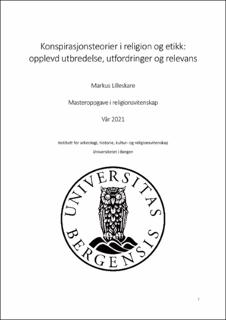Konspirasjonsteorier i religion og etikk: opplevd utbredelse, utfordringer og relevans
Master thesis
Permanent lenke
https://hdl.handle.net/11250/2761241Utgivelsesdato
2021-06-16Metadata
Vis full innførselSamlinger
- Master theses [240]
Sammendrag
In recent times more and more research emanating from different academic disciplines has been arguing that belief in conspiracy theories poses many dangers to society. Chief among these arguments is conspiracy believers’ tendency to consider violence a legitimate political intervention, and the fact that conspiracy beliefs are associated with religious- and right-wing extremism. However, very little research has been done on this topic in schools. At the same time, many conspiracy theorists point towards religious outgroups as the source of their perceived ills in society – which in turn might contribute to further alienation of religious minorities. This calls for more knowledge on the prevalence of conspiracy theories in schools and religious education classrooms. It also begs the question of whether teachers of the subject themselves feel like this is a topic that needs to be addressed in religious education, and which didactic arguments they use to argue for their perspectives. This masters’ thesis provides preliminary insights into these matters, with a primary focus on the subject of ‘’religion and ethics’’ in high schools. I have used qualitative interviews with teachers to research the topic. The thesis shows that while some of the teachers certainly feel like there is a bit of interest in conspiracy theories circulating among high school students, it is a relatively rare occasion for students to bring this topic to the fore in the religion and ethics classroom. However, the thesis also illustrates that the question of whether conspiracy theories should be taught in the subject brings to the fore some fundamental questions about the purpose of religious education in school. The most important of these questions is whether the religion-side of ‘’religion and ethics’’ ought to be considered primarily a subject to give students knowledge about religion and the dimensions of society it affects, or whether it should also be intentionally used as an instrument to help students understand our democracy and the pillars on which this political system depends.
